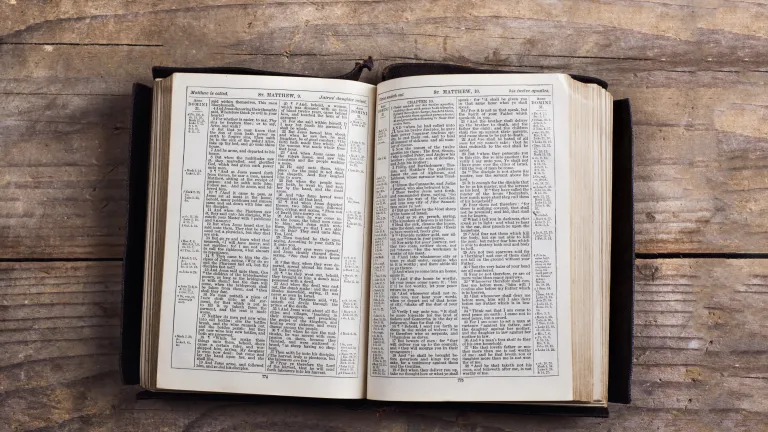The Sabbath in History and Prophecy

Learn the inspiring story of a group of people who found—just by reading the Bible—that they must keep the seventh-day Sabbath.
Imagine yourself opening a Bible for the very first time. You begin to read. And as you do, you read where God says, “Remember the Sabbath day, to keep it holy” (Exodus 20:8).
You also read where Christ and His disciples kept the Sabbath day, and you see that it says Jesus is the “Lord of the Sabbath” (Mark 2:28).
All of us understand the stresses and strains of this life. Keeping God’s Sabbath is a missing element in successful living.
What do you do? Do you follow Jesus, the Lord of the Sabbath?
This is exactly what some people have done when faced with the clear teaching of Scripture. It’s what followers of Christ will be doing when He returns.
In her book The Sabbath World: Glimpses of a Different Order of Time, author Judith Shulevitz makes an interesting observation: “Whenever people begin reading the Book [the Bible], they start keeping the Sabbath. And when they keep the Sabbath they read the Book” (2010, p. 2).
That’s exactly what happened to a group of believers in Transylvania in the 1500-1600s. Faced with what the Bible itself says about the Sabbath day, they realized they had no choice but to obey God by keeping the Sabbath as He commanded.
The Bible on the hinge of history
Life in medieval Europe was nothing like life in today’s world. Imagine that your life is completely and totally ruled by other people. Kings, princes, governors and priests dictate where you live, what you do for a living and what you believe.
Now into the darkness of your life comes a bright, burning light—the Holy Bible, translated for the first time into your own language. You start reading the Bible and realize that much of what you’ve been taught doesn’t match up with what God says. What do you do?
What about those Christians in Transylvania that I mentioned before? What did they do?
In their search for truth they discovered one of Christianity’s darkest secrets: Sunday worship (on the first day of the week) is a man-made—not God-made—tradition, and the seventh-day Sabbath was observed by Jesus and His apostles. What’s more, it meant that they, too, needed to keep the Sabbath.
In large part their story is defined by their leader, a man named Andreas Eossi. He was a nobleman, rich in real estate, who owned three whole villages, along with other, smaller estates. In many ways he was a sad man with a very sad life. His wife and all three of his sons died prematurely, leaving him wealthy but lonely. On top of that, Eossi’s own health was poor. He couldn’t even walk.
To fill his time and to heal his mind, Eossi read the Bible. His studies led him to a deep conviction that the church establishment was wrong to have changed the Sabbath from Saturday, the seventh day of the week, to Sunday, the first day of the week.
Soon Eossi led a flourishing and growing group of Sabbath-keepers in Transylvania. At the peak of the movement thousands of Sabbatarian Christians were living and teaching in the forests and mountains of Eastern Europe.
Persecution for Sabbath-keeping
But all wasn’t fine and peaceful for these believers. The Transylvanian Sabbath-keepers had limited protection from the Muslim-ruled Ottoman Empire to the east. But the supposedly Christian church authorities persecuted them for their biblical beliefs. In 1595, sabbatarianism was outlawed by the political and religious establishment.
Once their Sabbath-keeping became well known, Eossi and his followers came under intense persecution. They faced the confiscation of their property and real estate, their writings were collected and burned, and in many cases they were put in prison and beaten for their determination to keep the Sabbath holy. The persecution from both Catholic and Protestant authorities would only worsen over time.
When the persecution came for the rest of the Sabbatarian community in the mid-1600s it came quickly and somewhat unexpectedly. Even though Sabbath-keepers were often threatened with punishment if they did not publicly renounce their Sabbath- keeping, it was rare for the authorities to follow through on their threats. When the religious establishment finally did move on the Sabbatarians, they dealt quickly and harshly with them.
In almost every case the Sabbath-keepers’ property and possessions were confiscated, leaving them homeless and destitute. The once large and booming Sabbatarian communities of Eastern Europe all but disappeared after the widespread persecution. Sabbath-keepers were forced into obscurity, hiding among pockets of other minority Christians, keeping the Sabbath in secret, always fearing they would be found out.
Times have changed. Most people are not hounded and persecuted for keeping the Sabbath today. When I began to learn about the Sabbath and to keep it, it did create a major change in my life and relationships. But I experienced nothing like these people in Eastern Europe.
The story of these men and women who kept the Saturday Sabbath in history is fascinating. It was a time of religious awakening.
The Sabbath is a window into hope
What these people saw through the Sabbath truth was a glimpse into the long-prophesied Kingdom of God. Their own writings reveal this insight. As they read Jesus’ teachings on the Sabbath, they saw the Kingdom of God. They saw the Sabbath as a sign between the Creator and His chosen people. They believed that as they kept the Sabbath, they entered a covenant relationship with the same God who delivered the children of Israel from bondage in Egypt and made them a nation.
This leads us back to an earlier thought. As people read their Bible they discovered the truth of the seventh-day Sabbath. People were reading the Bible to gain an understanding about God and His purpose for their human life. They were looking for meaning amid their poor, bleak existence.
In a dark world, the Bible was a dawning light breaking on a confused and deceived European culture. Some few, and these people in Eastern Europe were among them, came to see the teaching of the Sabbath and embraced its teaching as part of their life. The Sabbath began to define their relationship with God and their entire life’s work.
They saw that by keeping the commandments on which God made a covenant with Israel, they themselves entered a spiritual covenant with God. This New Covenant was a better covenant with better promises. It was a covenant based on grace through Jesus Christ, the same God who made the first covenant, and who came to earth and died for our sins, who was resurrected and lives today as the King of Kings and Lord of Lords.
As they kept the Sabbath, they gained understanding and hope of the coming Kingdom of God. They saw that the rest that exists for the people of God through the Sabbath was a critical key to understanding the fullness of the coming Kingdom of God.
They realized that the Sabbath is a biblical key to unlocking the mystery of the coming Kingdom of God on earth with Jesus Christ as Lord. You really cannot understand this truth without proper knowledge and understanding of the Sabbath day.
Christ is the Lord of the Sabbath. He kept the Sabbath, and He taught us how to keep it today. He taught us how to enjoy a fuller life by observing the Sabbath. Far from doing away with the Sabbath, Jesus showed us how to live in the world of the Sabbath and improve the quality of our lives.
When we properly observe this day to God, we make a spiritual connection that is real, honest and true. It’s the foundation of the only meaningful relationship that can endure and see one through the challenges and trials, highs and lows, triumphs and tragedies of this mortal life.
When Christ said, “I am the way, the truth and the life” (John 14:6), He was showing the way forward through this uncertain life.
The Sabbath is a window into spiritual rejuvenation
To enter the world of the Sabbath is to enter a dimension where God dwells. Keeping the Sabbath by worshipping and fellowshipping with others of like mind is like being with God and Christ in spiritual fellowship. It’s a solution to the restlessness of our modern lifestyle.
All of us understand the stresses and strains of this life. But not everyone understands a vital key to getting in sync with God for the help to cope and manage the extreme stresses of today’s culture. Keeping God’s Sabbath is a missing element in successful living. To enter the world of the Sabbath is to enter the world of God.
There is another point that all Sabbath keepers, past and present, learn as they read the Bible. They come to understand that there is continuity between the Old and the New Testament. They understand how the two tell a complete story of God’s grace and offer of salvation through Jesus Christ. They understand how to put the Bible together. They also understand prophecy and how key prophecies of the Old Testament and the New Testament are yet to be fulfilled in the future.
Here is the challenge: Prove God by beginning to keep His Sabbath, the seventh day. Step out in living faith and prove what the Bible says about the Sabbath is true!
In one remarkable statement in the book of Isaiah God says: “If you keep your feet from breaking the Sabbath and from doing as you please on my holy day, if you call the Sabbath a delight and the Lord’s holy day honorable, and if you honor it by not going your own way and not doing as you please or speaking idle words, then you will find your joy in the Lord, and I will cause you to ride in triumph on the heights” (Isaiah 58:13-14, New International Version).
Live by the way of God’s Kingdom today
God’s Kingdom is coming to the earth, and Christ will rule over all. In the book of Daniel we find a remarkable prophecy that tells us when this will occur. The Kingdom the Messiah will set up “will not be left to other people” (Daniel 2:44). Who are those who receive the Kingdom of God? The book of Revelation says it’s “those keeping the commandments of God and the testimony of Jesus Christ” (Revelation 12:17). Will you be among them?
You will find the same truth that people for centuries have found. You will find the Sabbath is a key feature of the Word of God. And you will find the same choice they found—to keep the book open, and to keep reading. We hope you will make the change and begin to walk with God on His Holy Sabbath.
“You must observe My Sabbaths. This will be a sign between Me and you for generations to come” (Exodus 31:13).
The Sabbath is a key to the Kingdom of God. The New Testament book of Hebrews says, “There remains, then, a Sabbath-rest for the people of God” (Hebrews 4:9, NIV).
Jesus and His followers kept the Sabbath, and His followers still do today. God commands us to pause and reflect on His way of life. Take a break from the fast-paced action of this world. Experience a rejuvenation of the mind and grow closer to Him!







